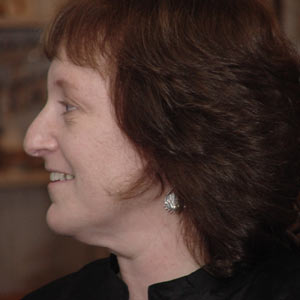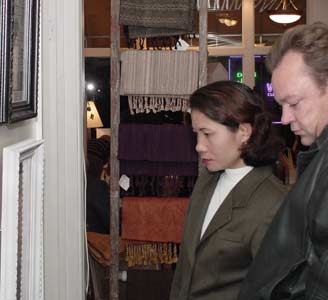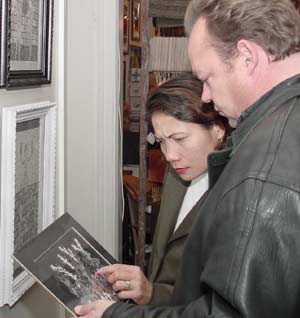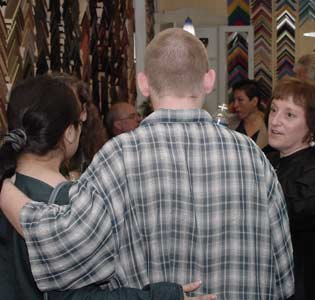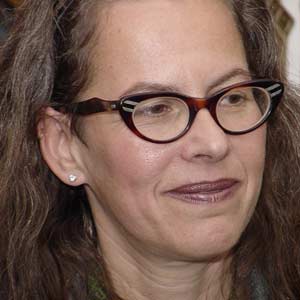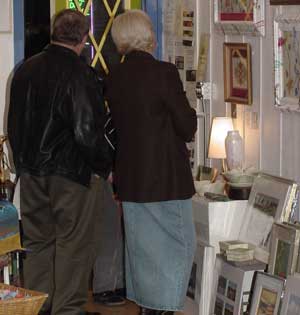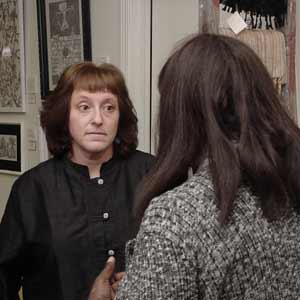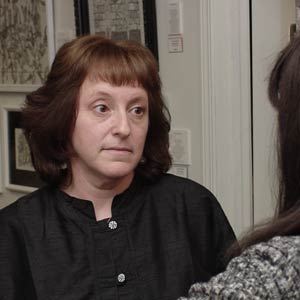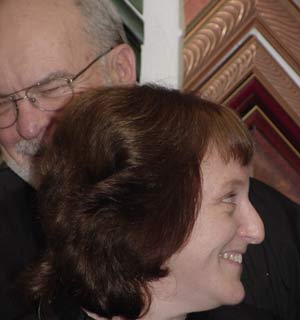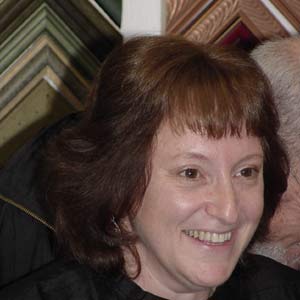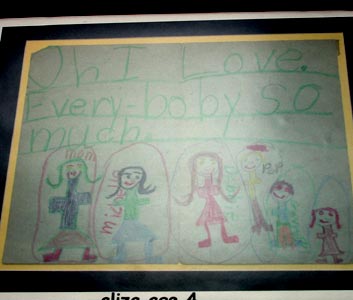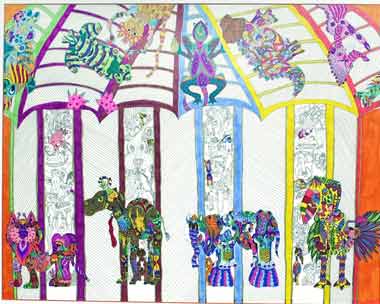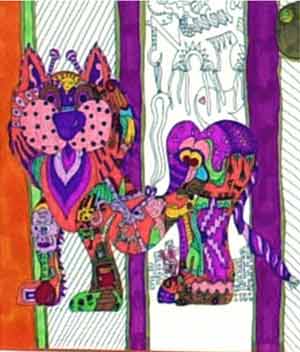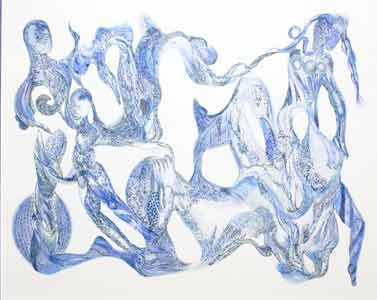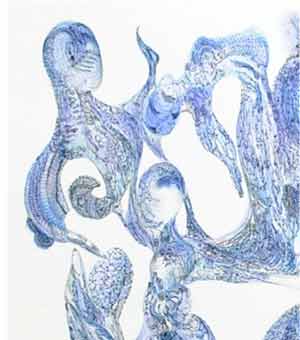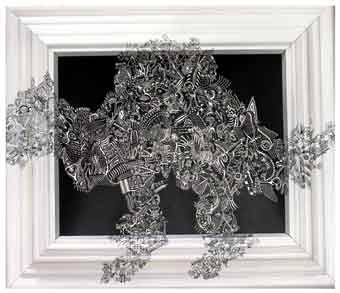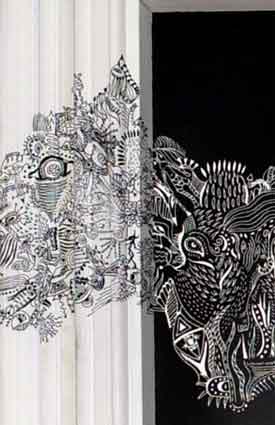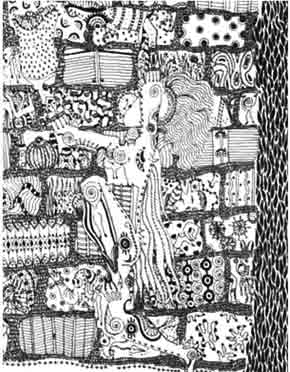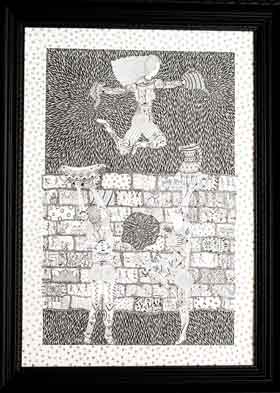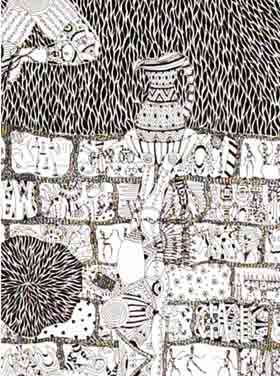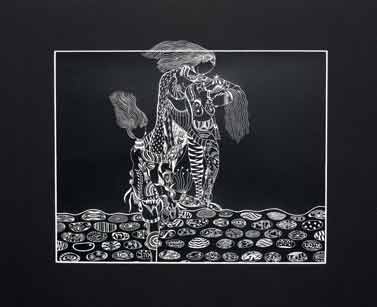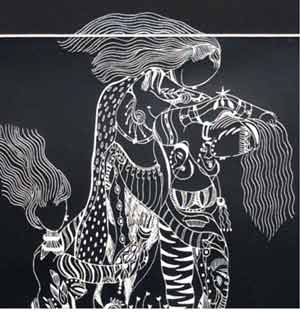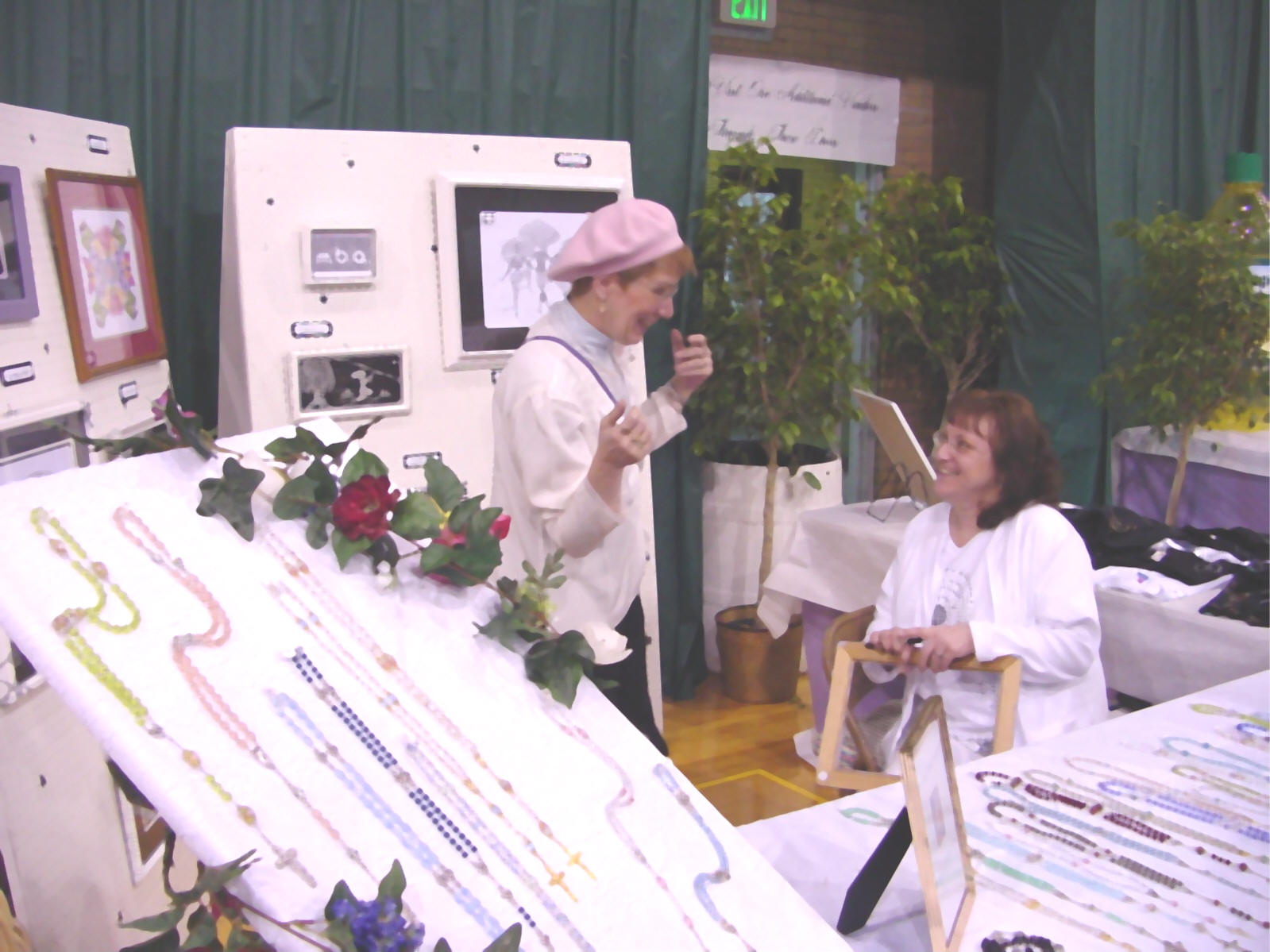|
Al: A kind of a womb? Aliza: Yes, kind of a womb. I had a whole world going on in there. I also loved books. Even before I could even read, I would take books to the closet. Once I began reading, I would just climb into the world of the book, and I would go from one book to the next book-there was no end to reading. I grew up in an Orthodox Jewish home, so on Friday night to Saturday, you weren't allowed to do any work. It was a normal thing to go to the library and take out a good stack of books, regardless of your age. Al: Wasn't that considered entertainment? Aliza: You could read on the Sabbath. I often had trouble sleeping as far back as I can remember. I would be up during the night when other people were sleeping, and during the Sabbath especially, the light was on a timer from the hallway. I would turn my head to the foot of the bed and read all night. That's what I did. The pictures in the books drew me into the world of the book. As far as drawing, nobody showed me how to do it; I just did it. I enjoyed it. I loved to color in coloring books. I loved to get it perfect and not to get out of the lines. I was a perfectionist! Al: Tell me about your other siblings. Aliza: I was the youngest out of four. I had an elder brother, sister, then another brother, then myself. We were very close in age. We came out-boom, boom, boom, boom!
Al: That was perfect psychotherapy. Aliza: It kept me alive. When I was a teenager, I ended up in the psych hospital, because I was anorexic and suicidal. I went into the hospital very willingly. I wanted to get out of the house, and a social worker offered me a place to go live. I didn't know it was a "loony bin," but that's what it was. I was so excited that there was somewhere that I could go. After a couple of days, I felt very much at home-I really did. I lived there for a whole year. There were teenagers, young adults, and senior citizens there. I went to school there. For the first time, school became not a struggle for me. I not only learned and got good grades, but they would encourage you if you were having trouble that day to talk. I had an English teacher who encouraged me to stop throwing out my drawing and poetry. So, that's where I began collecting my work. The only other person that really had anything to do with my art was my cousin. She lived in Chicago with my grandmother. I would go with her to the Art Institute where she went to school, and I would watch her paint in her studio. She was someone who brought a lot of comfort to me along with the English teacher. Al: Were you talking to any therapists at this time?
Aliza: She implied she didn't. When I did talk with her about it in 1990, she was very angry with me for bringing it up, and she wanted to know that I wanted from her. She had done some things to me that could be considered sexual abuse too. She might have been defensive when I brought up my father and my brother. She wanted some kind of proof of what happened. I was in the psych hospital because of what my father and brother had done. I wrote to my brother who was in Israel in 1976. He wrote back and said that it was just mere child curiosity. Al: What did you do then? Aliza: After the insurance ran out for the hospital, I was sent to a special school for kids with emotional, mental, and behavior problems. I only lasted there a few months and then dropped out. By then, I had a drinking problem, drug problem, and my anorexia continued. I saw a psychiatrist from 1976 on and off for ten years. He watched me spiral down through a lot of different things-addictions and a lot of different abusive relationships that I got into. I attempted suicide and spent a couple weeks in the psych hospital again. After I stopped drinking, my life changed. I still continued in a self-destructive way, made some poor decisions, and got married right away to someone who I barely knew. He turned out to be physically abusive, which is not a surprise. I got out of there real quick, but I was pregnant and raised my son by myself. He was the biggest blessing in my life-the biggest gift. 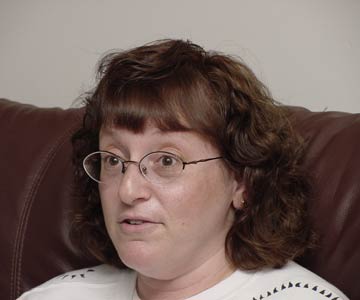
Al: What's remarkable about that relationship was that you got out of it so quickly. Aliza: I got out of it was because I scratched my head, and said, "Is this what its supposed to be like when you get sober?" It just hit me so strongly; I needed to act. It was more by the grace of God that I and my baby got out of there alive. I was very fortunate in that my life shifted dramatically once I had my son, Joshua. It was a very big struggle, because I had problems with hearing and seeing things. I thought it was the result of the incest and from my addictions of drinking and using pills. It was a struggle dealing with my problems and trying to raise him. Al: How old is Joshua?
Al: Were you ever diagnosed with what used to be called multiple personality disorder?
I work very hard to keep my life in order. Friends joke about how I like to have a place for everything in order. I need that so I can think because there is too much stimulation out there. When I'm in a grocery store, there are times when I have to leave, because of all the products, all the colors, and all the sounds from the people. Somebody can learn something from my artwork. Other people who have gone through what I have, and they don't have to be alone. I know that I can give them the strength to get the help that they need. They won't live their lives scared and troubled. If I die tomorrow, I've done well, because I know I have been doing well. If I die two years from now, then I will keep doing whatever it is, then it is two more years of worth. I once thought that God was punishing me when I was growing up; I see it now as a blessing. Each one of my drawings is a piece of me; they come from deep inside of me. I don't think them out. They are like a kaleidoscope. My hand just takes me places. God blessed me with a hand that just goes places while I am still here. I don't have to go anywhere.
Al: My friend, Barb, told about your artwork that was on black that was painted with white. Aliza: Well, not really. It's a scratchboard. It's like an India ink with a scratchboard.
Al: Did it get you out of the closet? Aliza: You get kind of noticed with colors. It's bright and very out of control, because once you start you don't know where to stop. Now, with black and white-that is just right. The more color that I do, the more my visualizations occur when I close my eyes at night. Things are always popping up. I even have dreams with cartoonish, whimsical characters. They won't shut off. They breed more and more. More havoc! There is more artwork in my face! I daydreamed a lot through school and got in trouble for not working hard enough or applying myself. They said that I had all that potential that I wasn't using. My siblings were very intelligent. My sister was perfect, and when I would get the teacher that she had, they didn't understand what went wrong. She would make straight A's and would smile all the time. She was perfect and had friends. I didn't smile or laugh. I doodled on my pages. It was extensive doodling at one time!
Aliza: I think that the reason that I'm still around is that I try to make some good of it. A therapist once said that it was like having flowers that have this aroma after they have been crushed. They are a different shape, but boy do they smell good-and sometimes even better. That's what happened with me. Al: Gene Siskel use to ask the person that he was interviewing what their favorite movie was? It was his way of getting inside the person. I would like to alter the question a little: who is your favorite painter? Aliza: Salvador Dali. Dali stands out with me. I just purchased a book that I hope to read someday soon. However, I never really studied about art, but I like Dali's paintings.
Al: When do you think the onset of schizophrenia began? Aliza: My doctor and I tried to figure it out. The incest stopped at age twelve, but I had already had symptoms prior to that, So, I really don't know for sure. Al: I require my psych students to write a term paper that has to do with a particular problem that they are facing. One of my students wrote a paper about her father being schizophrenic and her fear about the genetic predisposition. She was concerned about herself and her children. Aliza: I worry about Josh, but so far he's okay. Al: One final question: Fifty years from now when we have both died, what would you want your epitaph to read? Aliza: I thought about this many years ago. Then it would have been, "Life went unfulfilled." Now, it would be "Life went Fulfilled." My life is fulfilled. I always feared that I would be dead by twenty-two. It was then that my life began to change. It has taken a long time to turn my life around. I am forty-two now; it has taken twenty-years. I'm writing a book about my life. It's called Behind Closed Doors. Several months after my interview with Aliza, she had an art show at the Lake Street Gallery at Miller Beach in Gary, IN. The following are some of the pictures of the celebration--a celebration of an artist and survivor.
This is one of Aliza's first works of art. It pictures a happy family that she wished that she had. The following are several pictures and details of Aliza's art that weren't in the show but are a part of her much larger creative portfolio.
Animal Crackers
Detail
Blew Bayou
Detail
Gamel the Camel
Detail
Hair Here Shutters
Detail
The Merlin Wall
Detail
The Seed was Planted
Detail If you wish to email Aliza, click on this link: alizamba@yahoo.com
|







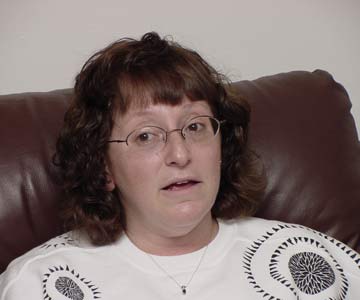 Al: Aliza, I have heard a lot about your art. How
was it that you started out to be an artist?
Al: Aliza, I have heard a lot about your art. How
was it that you started out to be an artist?  Al: Were any of the older children sexually abused?
Al: Were any of the older children sexually abused?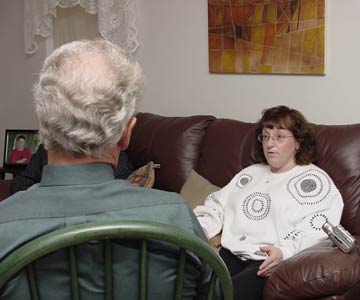 Aliza: My parents had brought me to a psychologist for testing. I think that I was eleven years old. I
sucked my finger a lot and couldn't stop. I had
braces, and my teeth were already growing out of shape again. The
orthodontist wanted them to get me to stop sucking my fingers so off I went to
the psychologist for testing. Incest never came up at that point. After
that testing, I saw a social worker on and off until the hospitalization at
fifteen in 1976.
Aliza: My parents had brought me to a psychologist for testing. I think that I was eleven years old. I
sucked my finger a lot and couldn't stop. I had
braces, and my teeth were already growing out of shape again. The
orthodontist wanted them to get me to stop sucking my fingers so off I went to
the psychologist for testing. Incest never came up at that point. After
that testing, I saw a social worker on and off until the hospitalization at
fifteen in 1976. Aliza: He is nineteen, and I cut off contact with the
family when he had his seventh birthday. I found out that my mother had been
kissing his butt. I don't know all what happened to him. I had a lot of people
helping me raise him. The Jewish Children's Bureau helped me a lot with the
counseling, guidance, and teaching me parenting skills. One of my first college
courses was parenting, and I got an "A." After my father died, there was like
an unleashing of emotions. It was just like it was all "corked up" inside me.
It just popped open, and all this stuff started flooding out of me. I started with my first support group for incest. I finally put a word, a name, a title
to these things that had happened to me. In doing so, I was able to get the
help that I needed. I had some wonderful counselors that helped. Then I met
Charlie, my husband. After we started to date, I became aware of all the things
that he had to live through also. Charlie was tremendous support for me, and as
a result of confronting the family, the more flashbacks that began to occur, the
more things began to connect.
Aliza: He is nineteen, and I cut off contact with the
family when he had his seventh birthday. I found out that my mother had been
kissing his butt. I don't know all what happened to him. I had a lot of people
helping me raise him. The Jewish Children's Bureau helped me a lot with the
counseling, guidance, and teaching me parenting skills. One of my first college
courses was parenting, and I got an "A." After my father died, there was like
an unleashing of emotions. It was just like it was all "corked up" inside me.
It just popped open, and all this stuff started flooding out of me. I started with my first support group for incest. I finally put a word, a name, a title
to these things that had happened to me. In doing so, I was able to get the
help that I needed. I had some wonderful counselors that helped. Then I met
Charlie, my husband. After we started to date, I became aware of all the things
that he had to live through also. Charlie was tremendous support for me, and as
a result of confronting the family, the more flashbacks that began to occur, the
more things began to connect. 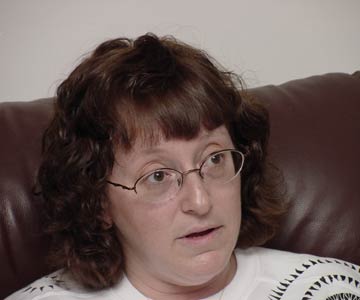 Aliza: No, they tested me, but the counselor thought
I had ADD, because I couldn't focus. She wanted to rule that out. So, I went
to Rush Presbyterian and did two days of hours and hours of testing. I was sure
they were going to tell me that I had multiple personalities. I saw a TV
special about it and thought that is what I had. However, they said I was a
paranoid schizophrenic with post-traumatic stress disorder from the incest.
Aliza: No, they tested me, but the counselor thought
I had ADD, because I couldn't focus. She wanted to rule that out. So, I went
to Rush Presbyterian and did two days of hours and hours of testing. I was sure
they were going to tell me that I had multiple personalities. I saw a TV
special about it and thought that is what I had. However, they said I was a
paranoid schizophrenic with post-traumatic stress disorder from the incest. 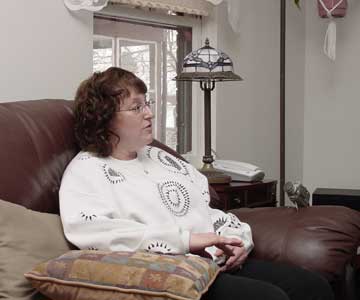 I shared my artwork with my psychiatrist in
Chicago, and he could tell when I was doing well and when I wasn't by just
looking at my style. I've worked with a lot of therapists with my artwork,
which is very helpful. When I was going to counseling someone said that they
were having an art fundraiser and asked me to participate. That's when my art
started going somewhere. I started selling my work instead of me just giving it
away. I love making cards. Until then, I was giving away the drawings to
friends and family. This actually was the first time that I started selling
stuff. It actually helped me. I mean, what you are looking at today is very
different than what you would have seen a few years ago. My big thing is
getting my stuff out with the message of hope to people. I am talking for other
people who can't talk because when it happens to you, you can't talk and "spill
the beans." when I couldn't talk, I became self-destructive. Thanks to my art,
I survived. Today, I enjoy living. I still have problems functioning and have
a hard time understanding people, but life is much better.
I shared my artwork with my psychiatrist in
Chicago, and he could tell when I was doing well and when I wasn't by just
looking at my style. I've worked with a lot of therapists with my artwork,
which is very helpful. When I was going to counseling someone said that they
were having an art fundraiser and asked me to participate. That's when my art
started going somewhere. I started selling my work instead of me just giving it
away. I love making cards. Until then, I was giving away the drawings to
friends and family. This actually was the first time that I started selling
stuff. It actually helped me. I mean, what you are looking at today is very
different than what you would have seen a few years ago. My big thing is
getting my stuff out with the message of hope to people. I am talking for other
people who can't talk because when it happens to you, you can't talk and "spill
the beans." when I couldn't talk, I became self-destructive. Thanks to my art,
I survived. Today, I enjoy living. I still have problems functioning and have
a hard time understanding people, but life is much better.
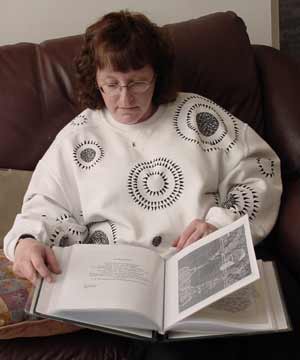 Al: What's interesting is that you have turned your
problem into a blessing rather than fighting it. You are healthier than a lot
of the people that are out there that think they are okay.
Al: What's interesting is that you have turned your
problem into a blessing rather than fighting it. You are healthier than a lot
of the people that are out there that think they are okay.
 Al: Like an engraving?
Al: Like an engraving? Al: You are a remarkable woman to have survived all that you did.
Al: You are a remarkable woman to have survived all that you did.
